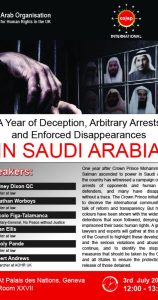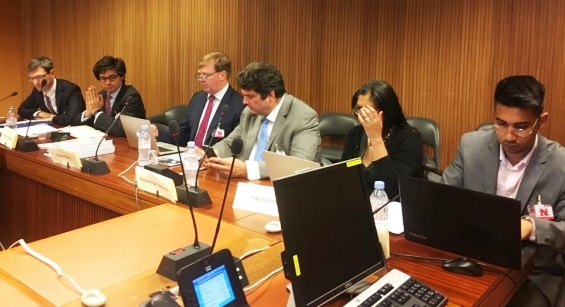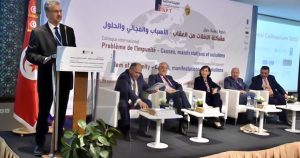Geneva, UNHRC, 38th Session, Palais des Nations, 3 July 2018
On 3 July 2018, The Arab Organisation for Human Rights in the UK (AOHRUK) and COJEP International hosted a seminar at the 38th UN Human Rights Council entitled “A Year of Deception, Arbitrary Arrests and Enforced Disappearances in Saudi Arabia”. The panellists speaking at the event included Niccolo Figa-Talamanca, Secretary General of No peace Without Justice, Aidan Ellis, Kakoly Pande, Jonathan Worboys, and Hala al Dosari. The seminar offered particular emphasis to incidents occurring over the last year in light of Crown Prince Mohammed bin Salman’s accession to power. The event was chaired by QC Rodney Dixon, co-author of the seminal report ‘Shrouded in Secrecy: the Human Rights situation in Saudi Arabia following arrests in September 2017’.
The seminar began with an overview of the situation of detentions in Saudi Arabia from Niccolo Figa-Talamanca. Niccolo started his talk by noting that the situation for human rights in Saudi Arabia is going through an important time for change. By this, Niccolo notes that Saudi Arabia is a member of the UN Human Rights Council and seems to care more about its human rights image given the onset of Mohammed bin Salman’s tenure in power. The shift in leadership, in this context, coincides with attempts to push a more liberalised agenda in Saudi Arabia. Here, Mohammed bin Salman has visited both London and Washington to promote ‘Vision 2030’ – a plan to reform Saudi Arabia through economic and social change. Thus far, bin Salman has granted women the right to drive and opened a more social space in an attempt, according to Niccolo, to ‘re-orientate the Kingdom back towards the West’.
In reality, however, bin Salman’s reforms have been ‘accompanied by a brutal and criminal military campaign in Yemen and a crackdown on human rights advocates and political freedom within the country’. Too often, according to Niccolo, arguments of defence against terrorism are acknowledged by the West, and Western media, as a rational for the illegality that accompanies bin Salman’s reform campaign. It is important, in this context, to view the situation in KSA with ‘clear eyes’ and view the Kingdom objectively, without justifying the illegality of the regime’s actions on the basis of the Kingdom’s proposed reforms. Indeed, numerous human rights advocates and campaigners within the Kingdom are waiting for, and face, trial in the Kingdom simply for challenging Saudi’s human rights record, or peacefully demanding basic rights.
In order to rationalise the detention of these individuals, the Kingdom’s use of anti-terrorism legislation is fundamentally problematic, according to Niccolo. Quoting the UN’s Special Rapporteur ‘Saudi Arabia is systematically using anti-terrorism law to justify torture and imprison human rights defenders’. This detention includes the use of electric shocks, sleep deprivation, band solitary confinement, to name a few tactics of repression. With peaceful avenues for remonstration being closed, and the lack of prosecutions for those carrying out repressive measures, the situation is fundamentally problematic in this context. With the confessions of those being tortured being used as evidence, the system is thus characterised by three fundamental wrongs: 1) arbitrary detention; 2) the use of torture; and, 3) the use of confession obtained by torture.
What is more, Saudi’s internal propagation of human rights abuses extends to the external through its campaign against Yemen, as noted by Niccolo. Here, in Yemen, a recent UN panel concluded that Saudi Arabia have targeted ‘a night market, five residential buildings, and a motel’, leading to the death of ‘157 civilians’. This has been supplemented by the use of its domestic methods of repression abroad. These actions ‘constitute fragrant abuses of humanitarian law’. The combination of internal and external repression and abuse of human rights, therefore, ‘consistently acting in violation of international humanitarian law’. Although Saudi Arabia is not bound by a number of legal covenants and treaties, it is bound by the Universal Declaration of Human Rights and international customary law (jus cogens) that prohibits the use of torture. Collectively, given the degree of abuse instigated by Saudi Arabia, the world cannot sit ideally by and measures, such as the removal of Saudi Arabia from the Human Rights Council, must be taken to put pressure on the Kingdom if it does not drastically change its actions. As noted by Niccolo, the opportunity for change is now given the regime’s concern with its image.

- Download the Flyer of the event
- Click here for further information on the event
For further information, contact Nicola Giovannini, Press & Public Affairs Coordinator, on ngiovannini@npwj.org.



